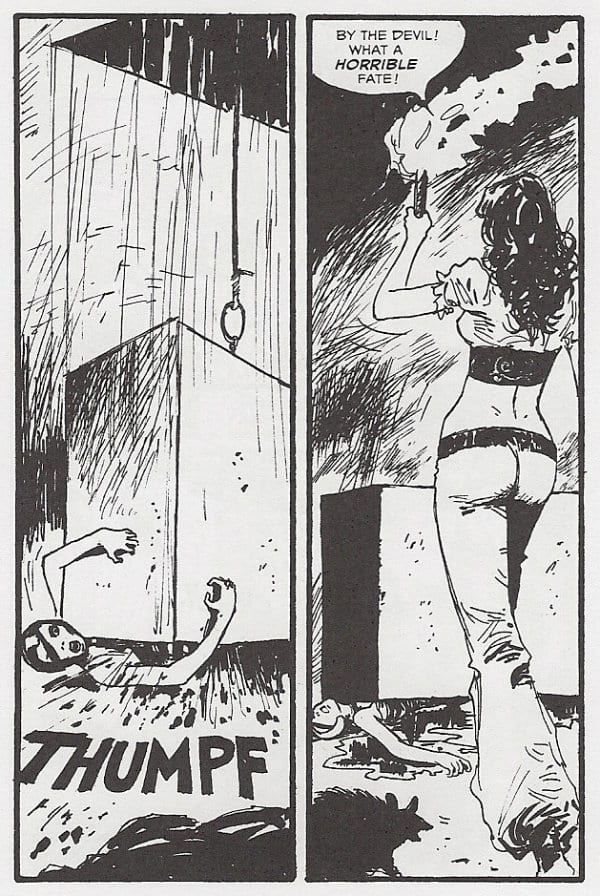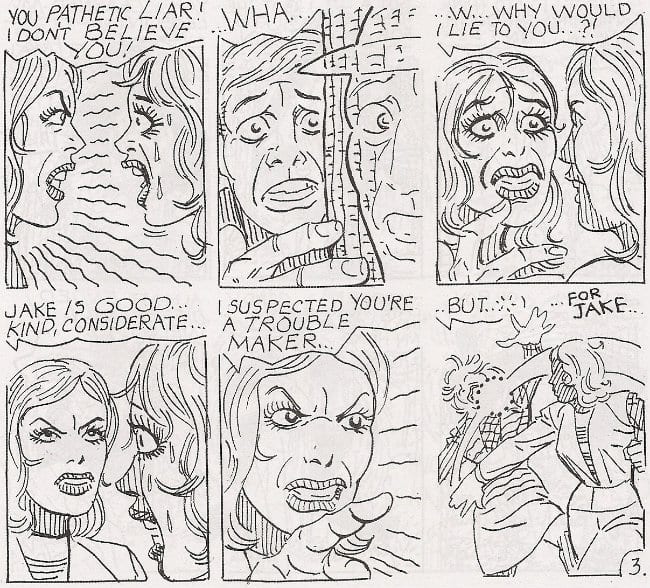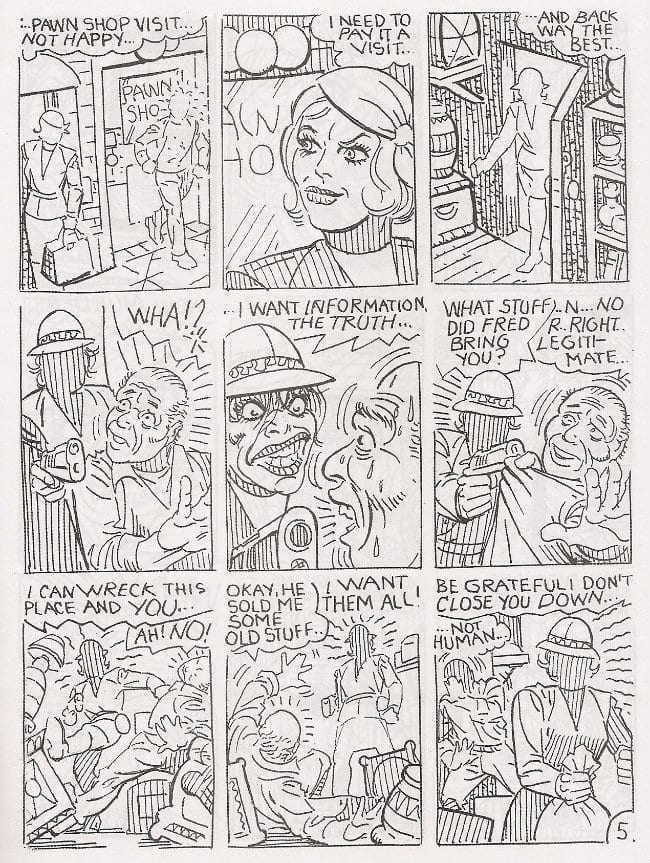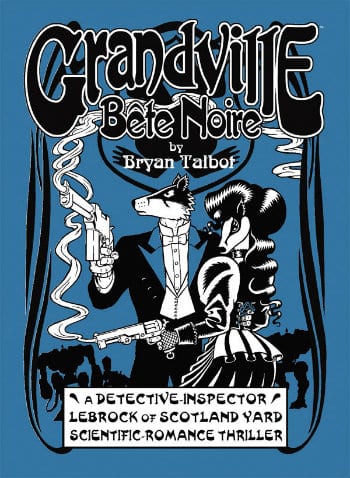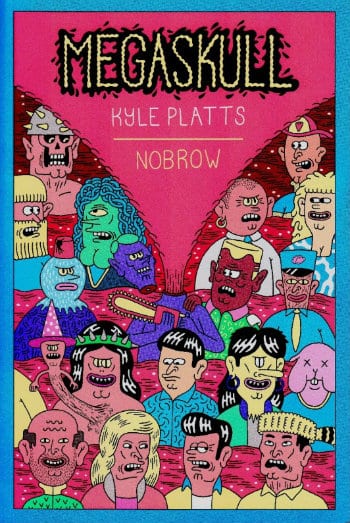A message from the takers, re: the makers, as transmitted by Mr. Steve Ditko on the back cover of the seventeenth and most recent issue of a 21st century comic book anthology series he's been publishing with Robin Snyder. The title is #17: Seventeen, and like many things Ditko it seems awfully mystifying until you've sobered up enough to see that it's really just perfectly descriptive, if uniquely emphatic. Likewise, you've probably heard that Ditko pens a little mini-essay to kick off the issue, though I doubt you've heard a lot about the content, since, unlike a similarly recent-ish essay in Snyder's The Comics Vol. 23 No. 7, it does not concern that famous Marvel superhero character Ditko co-created back in the '60s... the one with the movies... Iron Man? Oh, I'm not going to look it up!
But take it from your [J]ournal[ist](?) friend - this is a good one. Maybe the best single issue out of all the recent Ditko comics: 32 pages of full, gridded slam-bang goodness. A perfect jumping-on point, as they used to say. Well worth a purchase. Hell, I'll even vouch for the essay, an allegorical vignette in which a teenage couple -- unprepared, no doubt, for how hot their date was about to get -- encounter Ditko at the DC offices and immediately apologize for bothering him on the assumption that he does not like to talk to fans. They are wrong on that count, but having heard so often that Steve Ditko dislikes such encounters, "they turned their minds, their integrity, over to some outsider, a non-factual, non-objective source."
Anecdotally, I've spoken to enough artists around my age or younger who've corresponded with Ditko to vouch that he doesn't dislike such communications so much as he desires to keep such exchanges substantive; he's not an idle chatterer. On the other hand, bear in mind that I am still only repeating the stories of others: "The first dog barks at something, the neighbor dogs bark with the bark," the artist muses, reflecting a longstanding antipathy toward journalists in his body of work. Spider-Man may have been a photographer, who'd record news scientifically by himself, while Mr. A would pursue the dissemination of facts at any cost, but most times when you see a reporter in a Ditko comic they're confusing the issues at hand, invading the privacy of stalwart men and usurping the liberty of the individual to arrive at their own conclusions.
Naturally, several illustrations of the value of individual, first-hand observation are available in #17: Seventeen, which boasts five categories of fun in its guts. Let's examine each - Ditko, after all, is best understood by reading his work.
--
The Outline
Another canard: Ditko only deals in heroes. While it's true the Ditkovian perspective on art demands affirmation of humankind's potential, these aims can nonetheless be met by playing it a little naughty. Visible in panel #2 above, the Outline is one of Ditko's non-human metaphorical agents -- from planet Meta, perhaps! -- which interfere in earthly affairs mainly to externalize certain dramas of the human condition. Like a dapper, devious doppelgänger of Mr. A, the translucent Outline floats around society sniffing out moments of irrationality, and sometimes whispering encouragements into hapless ears, egging them onward to catastrophe.
There are two Outline stories in this issue, the better of which neatly encapsulates Ditko's essay theme: a man is seething, certain that his beloved is unfaithful, driven to rage by his paranoia! But even as the Outline tries to needle him along, the man suddenly comes to see with his own eyes the two-fisted fidelity of his terrific girlfriend, who reacts to some local floozy talking smack by dropping her right there. Note the circular blank zone at the point of impact - the righteous hands of Ditko's rational actors seem to obliterate the very being of their targets. All in all, a romance of the mind and body, though the Outline remains dissatisfied. "Almost ended differently. Oh well..."
--
The Distorter
Other metaphorical agents take a more active role. One of the main (eight-page) features in #17: Seventeen concerns the Distorter, a disembodied (or perhaps just very skillfully off-panel) hand protruding from a ruffled carnival magician's sleeve, which mutates the bodies of regular folk to reflect their inner state. Here a trio of industry titans at a private meeting are revealed to embody the negative principals of Force (violence, imposition, anti-liberty: SPIKY) and Compromise (weakness, persuasion, unprincipled: WOBBLY), vs. the positive state of Objective Goddamned Rationality, depicted in smooth, orderly lines: a mathematical certitude that radiates assurance of some mission in the world.
This conflict illustrates the visual properties of Ditko's current art, where his style of drawing is utterly indivisible from the content of his stories. It is Total Message Comics of a sort playful enough to have the Distorter -- Ditko himself, we might imagine -- suddenly zap everything back to traditional representation just in time for a bout of ass-kicking among America's movers & shakers. Remember: responsive force is okay! And fun!
--
The Cape
Not an unofficial comics adaptation of the short-lived NBC television superhero show, but a set of four one-pagers in which a cloak-like vortex absorbs luckless neurotics and blowhards, dissolving them down to component dots and giving them a dose of logical understanding, the details of which are kept hidden from we, the readers. Ditkovian super-compression, or: your 'art comics' interlude.
--
"Look Out"
Tucked away in the midst of all this meaningful mayhem is a six-page chiller that could have come straight out of The Many Ghosts of Dr. Graves, had that august forum abandoned the supernatural entirely for a hardcore focus on psychological distress. Nobody in American comics has ever mastered the art of people freaking the fuck out like Steve Ditko, and that's what we get in this Poe-like flyover of a thief who can't stop believing that all eyes are upon his guilty brow.
I tend to find these kinds of stories the most humanizing of Ditko's works; for all his invocation of the excellent potential of the human mind, the visceral kick of his art comes from his profound sensitivity to anxiety, obsession, self-loathing: the mess of human living in a damned fallen world. Look at that guy's head *splitting in half* in panel 4 - is that a photocopier effect? Definitely it seems like a foreign technological incursion; all those broken sentences read otherwise like the collapse of language in the face of unutterable realizations, words transformed into marks in perfect parity with the lines that compose the bodies of every Ditko hero and villains. These are stories where everybody says what they mean, and... what they mean... is...
Well, you can read it, right? Can't you see? With your own eyes?
--
Miss Eerie
But it wouldn't be Ditko without some old-school superhero shitkicking, so I'll close out with the other eight-page feature of #17: Seventeen, a self-contained adventure for Miss Eerie, a principled detective from the 1930s who slips on a scary mask (and an awesome hat) to punch mysteries until they are solved. I love this page, I love the angry lines leaping from Miss Eerie's head, I love the transition from her holding the shop owner at gunpoint to kicking over the lamp - I love how 85-year old Steve Ditko has managed more female-driven action in this comic than approximately 49 of the New 52.
Keep those eyes open, though, and witness a certain truth about Ditko's superheroes. Having observed her criminal quarry exiting the Pawn Shop in panel 1, Miss Eerie instantly confronts the proprietor with her pistol. He's totally correct that she has "..n...no r..right..," but in the Avenging World, laws can never supersede good old rationality. That's why the Ditkovian hero is so often a vigilante, not a cop: because they can overcome even the limits of black-letter statute -- received wisdom, pretty much! -- and afford humankind a dose or two of instant gratification. Bedrock superhero appeal, you might say, but this metaphor sits at the very center of Ditko's art - perhaps when we all approach the shining city, we can drown these governmental restrictions and cohabit our individual yards in peaceable logic! Until then, a rationalist must only pursue his or her objective, one five-fingered considered response at a time.
***
PLEASE NOTE: What follows is not a series of capsule reviews but an annotated selection of items listed by Diamond Comic Distributors for release to comic book retailers in North America on the particular Wednesday, or, in the event of a holiday or occurrence necessitating the close of UPS in a manner that would impact deliveries, Thursday, identified in the column title above. Not every listed item will necessarily arrive at every comic book retailer, in that some items may be delayed and ordered quantities will vary. I have in all likelihood not read any of the comics listed below, in that they are not yet released as of the writing of this column, nor will I necessarily read or purchase every item identified; THIS WEEK IN COMICS! reflects only what I find to be potentially interesting.
***
SPOTLIGHT PICKS!
Grandville Bête Noire: Had you asked me around the turn of the century what sort of things British comics institution Bryan Talbot would specialize in for the new millennium, "furry steampunk" would not have been first words to my lips, yet here we are with the artist's third Dark Horse-published all-color hardcover album in the very entertaining Grandville series, tracking an all-action badger and his rat sidekick through political machinations and personal intrigues. This time it's murder in the art world across 104 pages, generously following Talbot's big graphic novel release of last year, the more '20th century' literary Dotter of Her Father's Eyes, created with his wife, Mary M. Talbot. Preview; $19.99.
Megaskull: Keeping it British this week, with a 52-page Nobrow compilation of humor comics by Kyle Platts, a young and well-traveled illustrator whose pages glow with a certain rotten energy. Worth a flip, I'd say. Samples; $13.95.
--
PLUS!
Sumo: Another week, another sturdy little YA-ready bookshelf comic, this time a 112-page monochrome piece from the specialists at First Second and artist Thien Pham, who worked with Gene Luen Yang on a book titled Level Up a while back. It looks like Pham has since gotten into a more refined, streamlined visual style for this scenario of a football player who gets into sumo wrestling to the eventual good of his perspective. Preview; $14.99.
Krent Able's Big Book of Mischief: This is a new 8 3/4" x 12" Knockabout release -- yes, British again -- compiling 64 pages of violent color satires on rock and pop personalities by Krent Able, an artist with whom I'm not familiar, though he comes well-recommended. Much of this week bristles with unknown quantities to me, as you can see. Samples; $18.99.
The Hollows #1 (of 4): On the other hand, I do have certain visual expectations for the work of Sam Kieth -- a product of having read The Maxx at an impressionable age and glommed onto it as the all-in-one 'Vertigo' of the Image comics revolution -- and this is his new showcase series from IDW, a Chris Ryall-written thing seeing Japanese society retreat to giant trees while evading life-sucking beings from the radioactive wastes below. Preview; $3.99.
Change #1 (of 4): Your Image debut of the week, a new miniseries from writer Ales Kot positioning Los Angeles as the city of Atlantis, whirling through a cycle of erection and destruction, albeit with several parties aboard capable, perhaps, of affecting... you know. Art by Morgan Jeske. Preview; $2.99.
Age of Bronze #32: Not in any way an Image debut, but consider yourself on notice for the newest installment of this 14-year old Trojan War account by Eric Shanower, which I frankly consider to be one of the last remaining looooongform b&w comic book sagas still serialized in that format. Preview; $3.50.
The Couriers: Complete Collection: Man, you know what else is over a decade old? Couscous Express, a 2001 Brian Wood/Brett Weldele graphic novel from AiT/Planet Lar, and a straight-ticket embodiment of a micro-era's attitudinal renditions of genre comics stuff, intent (it seems, from the echo of history) on reforming the state of comics by evoking all the coolest traits of non-comics media in as straightforward a manner as possible. Not too many years later this stuff would be labeled 'movie pitch comics,' but at the time the whole notion of seeming like a movie was a matter of sheer aspiration centered more on improving comics-as-comics - or so says the nostalgist. Maybe the most early '00s thing you can possibly buy this week short of plucking Mark Millar back-issues of The Ultimates out of a bin, this 360-page Image compilation also comes with three subsequent books Wood (whose Dark Horse series The Massive sees its issue #7 this week) created with artist Rob G. Samples; $24.99.
Kamandi, the Last Boy on Earth Omnibus Vol. 2 (of 2): Another Jack Kirby hardcover from DC, snapping up the remainder of the artist's tenure on this '70s creation, issues #21-40 across 416 pages; $49.99.
Tarzan: The Russ Manning Years Vol. 1: MOREOVER - Dark Horse has 288 pages of '60s Gold Key jungle adventures from the Magnus, Robot Fighter creator and artist of various Tarzan newspaper strips, here adapting works by Edgar Rice Burroughs. There's also lot of reprints and new editions out from IDW this week, including a softcover version of Darwyn Cooke's Parker: The Hunter, a compendium of Star Trek newspaper strips and Archie: The Best Of Samm Schwartz Vol. 2. Samples; $49.99.
Battle Angel Alita: Last Order Vol. 16: Hey, you know what's one of the good things about a gigantic ongoing manga series having its English translation catch up with the Japanese editions without the benefit of a viable serialization apparatus to keep readers legally contingent of the project's continued survival? You don't even notice the damn thing switched publishers! As such, this is the first Kodansha edition of Yukito Kishiro's eternal seinen robot violence series, picking up right where Viz left off. Vol. 17 dropped in Japan last April, and it's due in English come February '13; $10.99.
--
Finally, here's your Milo Manara image of the week:
